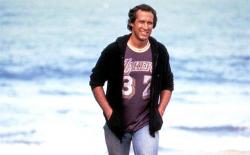With the release of Terry Gilliam’s The Zero Theorem looming (The film rolls out on March 14th), and with all the exclusives, casting announcements and hype surrounding Zack Snyder’s Batman vs Superman, the war of words between Zack Snyder’ producer Joel Silver and Terry Gilliam has become somewhat of a political football as of late. However, there are two potential factors that seem to have been left on the proverbial cutting room floor. The fact that the embryonic stages of both films were around twenty-years apart and also the reports that both Snyder and Gilliam’s pre-production teams had the same problem; which was how to adapt the ending of Alan Moore’s Graphic Novel into a film-able concept.
Considering the fact that it has now been five-years since the release of Watchmen (2009), it has had time to settle and find a place nestled amongst individuals’ home entertainment collections. This allows lovers, haters and naysayers to discuss the good, the bad, the visuals and the style, the casting and the acting and so forth – permitting the film to being subject to individual differences and how these are susceptible to change; how repeated viewings can affect opinion.
Moreover, films can be under-appreciated upon their initial release – all one needs to do is look back at John Carpenter’s filmography, or Stanley Kubrick’s The Shining, for near perfect examples of critical back-peddling. Where Watchmen differs is that it was bound to create contention from the get-go, regardless of choice of director. This inevitably comes with the territory when adapting films that are based on revered Graphic Novels with an overtly loyal built-in fan base. It’s a catch-22 situation; a real damned if you do, damned if you don’t.
And, lest we forget, sometimes–and this hawks back to a lot of the cult classics– the time just isn’t right for the release of a film. No matter how much is spent on marketing and advertising, as Zack Snyder is quick to point out: “That’s the problem with comic book movies and genre. And I believe that we’ve evolved – I believe that the audiences have evolved. I feel like Watchmen came out at sort of the height of the snarky Internet fanboy – like, when he had his biggest strength.
“I think if that movie came out now – and this is just my opinion – because now that we’ve had Avengers and comic book culture is well established, I think people would realize that the movie is a satire.”
The war of words was espoused last week when producer Joel Silver stated: “Zack came at the film the right way but was too much of a slave to the material.”
Furthermore, he exacerbated things by praising a version of the film that had been in development way back in 1989, penned by Sam Hamm (1989’s Batman) and Charles McKeown (Brazil), with Gilliam set to direct.
There ending in Gilliam’s version – which was part of Silver’s evidence that Gilliam would have made a “MUCH much better movie”– has Doctor Manhattan going back in time and stopping himself being created to save everyone else. Low and behold, Snyder has hit out, calling this ending “completely insane” and part of the reason for him making the movie was “because he knew the studio would have made the movie anyway and they would have made it crazy.”
He says that “he finally decided to make the movie to save it from the Terry Gilliam’s or the world.” Ouch.
Zack has claimed that in his version the morality of the tale succeeds as a parallel to the Graphic Novel and that he had just used “slightly different devices” and so, it was still inherently connected with the end of the Graphic Novel, stating: “the Gilliam version, if you look at it, it has nothing to do with the idea that is the end of the graphic novel. And that’s the thing that I would go, ‘Well, then don’t do it.’ It doesn’t make any sense.”
Snyder has also claimed that he would not have randomly picked an ending out of thin air, just for the sake of it being a cool ending (implicitly insinuating that this is what Joel Silver et al had in mind). Snyder also calls out some of the earlier criticisms and hints that he may well have a firmer grasp of the satirical nature of the source material. Pointing out that the irony went over their heads when some of the critics deemed the visual style as looking too much like a video game, with Snyder responding rather dryly: “Well, maybe that’s because it’s suppose to look like a video game.”
On the flip side, Terry Gilliam has now hit back at Snyder on his Facebook page and not being one to hold back, here is what he had to say: “…here’s a puzzle: Who are ‘The Terry Gilliams of the world’? Apparently the film of The Watchmen was made to save it from them. Who are they? What threat to the world do they pose? Can we stop them before they destroy other films of graphic novels?”
What needs to be stated here is that Snyder’s film is generally viewed in a positive light, and so it should be, because it is a damn good adaptation that was a “labour of love” for Snyder, which was evident during on-set interviews and more clearly evident on screen as a finished article. He knows the source material. Also, the timing of the conception of Gilliam’s version was 1989, which was when Watchmen was more-or-less considered unfilmable. So, as well as the ending of the movie, there would have been other changes that would need to have been made. The same was also true when Snyder took the film on, with many industry folk and fans alike, claiming that it was unfilmable (this was in 2009!), and that Snyder was faced with the same challenge; which was the issue of the most appropriate way to end the movie on celluloid.
With Gilliam out on the promo circuit for The Zero Theorem, and Snyder rumored to be unveiling the new Batsuit soon, there is no doubt that this feud still has some mileage; there is still some gas in the tank so to speak!





Nerd Comments